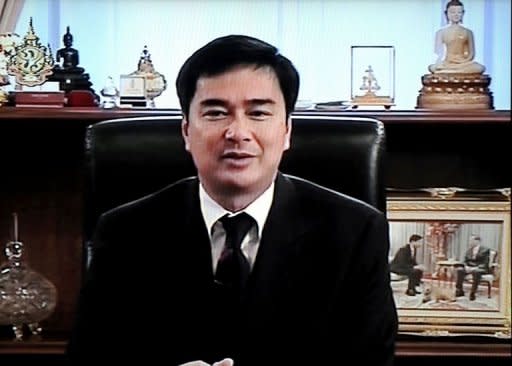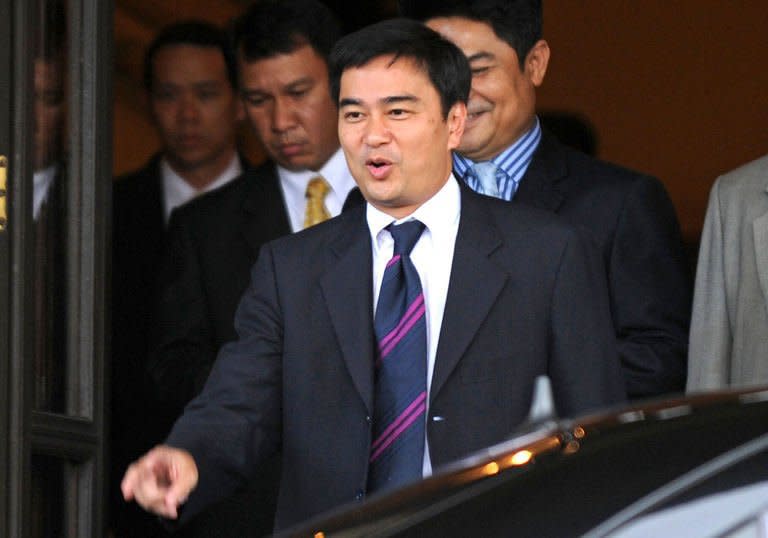Thai general election to take place July 3
Thailand's election countdown began on Monday when the government set July 3 for what promises to be a tough battle, after the king endorsed a decree to dissolve the lower house of parliament. The vote comes at a hugely sensitive time for Thailand, a year on from an army crackdown on opposition "Red Shirt" rallies in Bangkok. Clashes between troops and protesters left more than 90 people dead, mostly civilians. The polls in the deeply divided nation are expected to be dominated by a fight between premier Abhisit Vejjajiva's elite-backed Democrat Party and the opposition allied to his arch-foe, fugitive ex-premier Thaksin Shinawatra. British-born Abhisit, whose term finishes at the end of this year, submitted the decree to the palace last week, gambling on the early and potentially volatile polls to secure him a second term and silence critics who say he has no popular mandate. Abhisit's party is Thailand's oldest with a support base in Bangkok and the south, but it has not won a general election in nearly two decades and faces a struggle to cling to power, even with the backing of its coalition partners. "I believe this house dissolution is the beginning for Thailand to move forward in order to effectively solve problems through democracy. That's why I did it willingly," he said in a pre-recorded message broadcast late Monday. He confirmed the dissolution would come into effect on Tuesday following the king's endorsement of a royal decree. Earlier Monday, government spokesman Panitan Wattanayagorn told reporters the election would be held on July 3. By law, polls must be held between 45 and 60 days after the house is formally dissolved by the monarch, the highly revered 83-year-old King Bhumibol Adulyadej. Many of the mainly rural, working-class Reds are loyal to Thaksin, who is considered the de facto leader of the opposition Puea Thai party despite living overseas to avoid a jail sentence imposed in absentia for corruption. Puea Thai, which is particularly strong in the rural north and northeast, has not yet announced its candidate for prime minister, although Thaksin's sister Yingluck Shinawatra has been considered a top contender. Parties linked to Thaksin have won the most seats in the past four elections, but the former tycoon was toppled in a 2006 coup and court rulings reversed the results of the last two polls. Abhisit took office in a 2008 parliamentary vote after a court threw out the previous administration, and he is accused by his foes of being an unelected puppet of the military and the establishment. He defied sceptics to survive the crippling political crisis precipitated by last year's political violence -- the country's worst in decades -- but the country remains deeply split over the events. "We know that there is a slim chance of national reconciliation whether the Democrats or Puea Thai win the election and heads the administration," wrote former Bangkok Post editor Veera Prateepchaikul in the newspaper on Monday. "Yet we stick to voting for either of the two arch-rival parties." The divisive Thaksin, a former billionaire telecoms tycoon who led his party to landslide victories in 2001 and 2005, is hailed by the Reds for his policies for the poor while in power. But he is regarded by the Thai ruling elite as authoritarian, corrupt and a threat to the respected monarchy, and faces terrorism charges in Thailand, accused of bankrolling last year's protests and instigating unrest. The authorities have clamped down on Red Shirt media and last month police raided more than a dozen radio stations sympathetic to their cause. The current army chief has ruled out a military coup, but that has not dampened speculation of possible army intervention in a country that has seen 18 actual or attempted coups since it became a constitutional monarchy in 1932.



